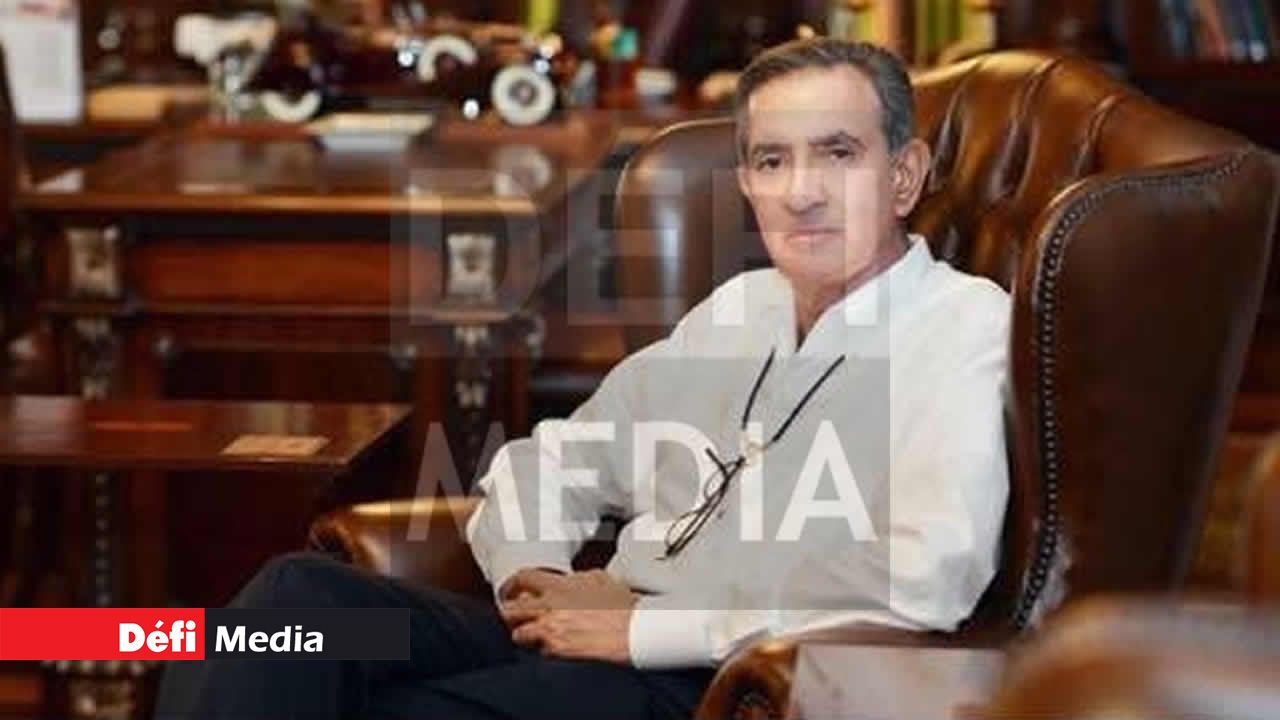
So in 1984, almost five years after the first offer, I took the momentous decision to accept the move to the head office. I was about to be forty years old and already considered somewhat successful in the Mauritian society. My wife Ayesha was very supportive of the eventual move. She understood that we were accepting an enormous challenge and gave me the strength to consider the invitation positively. She had realized that with our young family of three young girls, the burden of such an enormous change in our style of life in Mauritius will be traumatic. Even at that age, I had already served as chairman of the Employers’ association, the MEF. I had already been invited as a guest of the Government of the USA to visit the US in 1982 and given the option to take along with two other guests. I invited the then Secretary of the Chamber of Commerce ... Montocchio and Nasir Gopaul, a young Cernéen journalist. I had also taken the initiative to produce the first color magazine on the benefits of investing in Mauritius just after independence.
Publicité
I received the help of nine other banks and private companies who agreed to contribute then Rs 20 000 each along with BAI to be distributed during our one month stay visiting America East, West, North and South to meet with potential interested parties. Two very interesting things happened during that month. First, the State Department introduced a Washington lobbyist to me. We met at a breakfast in my hotel in DC and Dr. Smith, the lobbyist, proposed me a deal which would ensure an increase in our textile quota allocated by CONGRESS. He only requested a payment representing one dollar for each additional textile units such as polo shirts. The number he assured me he could get was an additional 500 000 units per year. Back in Mauritius, I immediately went to communicate that information to a high ranking politician, whose position, I will not disclose now, but will name him in my book. I explained to him, that since I was not involved in that business, I intended to inform formally the Chamber of Commerce. The politician immediately jumped on that statement encouraging me to deal with him directly first instead of the Chamber, proposing that both of us take over that offer and make money for both. I flatly refused, explaining that I did not take part with that type of dealings. The second interesting happening during that US visit was the meeting with the man from the West Coast who wanted to represent Mauritius as Consul. Incidentally, he recently resigned from that position.
Before my move, I hired and appointed Alain Cheong as my replacement. It was my personal decision and not one imposed by the head office. Alain was a very bright actuarial professional. I had always recognized the merits of bright and hard-working individuals, but also realized the utmost importance of looking for qualified potential leaders to take responsibilities that otherwise, as was the practice then and now, to give these positions to only immediate family members or applicants of their community or of the religious affiliation and caste. Alain ran the business extremely well for almost fifteen years until his untimely death at the end of 1999.
In the US, as Senior Vice President, I moved quite fast up the ladder being promoted almost every year to emerge as President of the world wide group in 1988, just four years after I landed in the US in mid-1984. Two years later, I became the Chairman of the board. Soon after, by 1992, I did a management buy-out with an American partner, Joe McClaugherty. I reorganized the group, selling most operations, Malaysia, England and all the Caribbean islands including Trinidad. That was twenty years ago which, for reasons known only to V. Lutchmeenaraidoo, I still was supposed to be connected to, creating the horrible excuse to destroy a great company. I will come to that later. I placed a lot of our future on our African operations and we were heading towards attaining perhaps the biggest value jump than any other business in Mauritius could ever dream of or attain locally. No Mauritian business leader has had the experience I develop over forty years with Africans.
I believe Mauritius has done relatively well considering its limitations within the business intelligentsia and macro-economic rigidity. The whole world in Mauritius used to be limited to the sugar industry. The work schedules of just about every citizen in those days revolved around the requirements of the sugar industry. The holidays, the education needs, the working hours and the social hierarchy. Whatever second line businesses besides the sugar factories and plantations were derived from the sugar oligarchs purses. You needed a car, guns, plane tickets or wanted to buy shares, needed a loan. Name it and they controlled it. Competition was never tolerated, I know the strategies used with the help of the traditional media. Funny how the word traditional can hide your skin color.
I believe Mauritius has the wherewithal to succeed beyond its present economic performance. Most of the recent leaders promised catapulting the country to the Singapore heights. All have failed. So on a scale of ten, I would give Mauritius a 4 for its performance compared to a 1 for the majority of countries in Africa despite their enormous raw materials available, one huge example is certainly Madagascar.
What is according to me the constraints holding down Mauritius. First, I would take the size of the market and its economic infrastructure. First and foremost, the lack of capital, both in assets and working capital, handicap any potential entrepreneur unless he is a member of a protected communal group or to state in politely using the media jargon “ the traditional groups whether private sector or media itself”. I leave it to your listeners to guess how it works. I am not criticizing any group in particular, but stating realities of the economy and the hypocrisy of those who believe, often rightly, that they control public opinion. My point is that the majority of very small and medium entrepreneurs cannot access capital in any form or shape. Mid-size businesses live from month to month, only surviving through high interest loans they will pay forever as they do not own any assets of real value. Again the market is a tiny one. Worst, there are only five or six very big groups in the private sector which live along with another very big but quasi private sector. Why do I spell this out as a double private?
Well, simply because there is another huge private sector group controlled by the government of the day. How does one compete, as either one of your competitors from either group can create walls or barriers of entry around you. You need capital, then try the stock market, well you will find out who controls that farce known as our exchange. They can help you if you are from one of the protected groups or make your life miserable. And believe me, they can and they do. So, if you need to borrow money where do you go as the leaders of your competition can influence whether you get it or not. They will always get wonderful coverage from the independent and traditional media who are clearly beholden to them. Do not hold your breath if you expect a fair treatment in business. You can plan to build the most extraordinary organization such as a futuristic hospital for the benefit of all. The media representatives, who behave like the proverbial dog of his master’s voice logo, will be waiting in ambush before you even lay the first brick, they will interview your potential competitors who almost every month will explain the reasons why you will fail. Some communities will boycott your institution similar to the way they choose soft drinks.
There is so much to relate about why and how the plot to destroy our group was incubated and by whom who patiently weaved his destructive web, aided and abetted by so called professionals in the accounting world helped also by a certain section of the self-christened independent press.
(To be continued :Part III)
Dawood Rawat
Read also : Reminisces part I : A short take on my career with BAI

Notre service WhatsApp. Vous êtes témoins d`un événement d`actualité ou d`une scène insolite? Envoyez-nous vos photos ou vidéos sur le 5 259 82 00 !





















